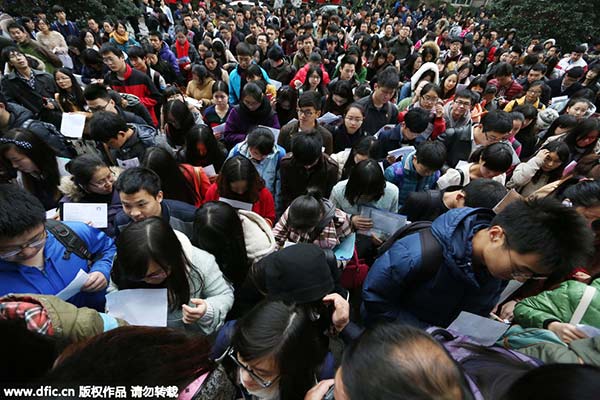Are State employees a heavy burden on taxpayers? Not if they do the job
(China Daily) Updated: 2016-06-02 07:51
 |
|
Chinese examinees walk towards an exam site to attend the 2015 China National Civil Service Examination in Nanjing city, East China's Jiangsu province, Nov 30, 2014. [Photo/IC] |
The ministry of Human Resources and Social Security recently announced that China had 7.16 million civil servants at the end of 2015. That number looks small compared to the huge population, but China has many other State-sponsored employees that are not civil servants but who are still paid for by taxpayers, says Beijing News:
There have long been claims that there are too many State employees in China, which place a heavy economic burden on taxpayers. The ministry has done a good deed by publishing the number of civil servants, which shows they account for a not-so-high percentage of the whole population.
However, the "civil servants" here mean those enlisted in government departments. There are many government-sponsored staff in China who are not considered civil servants but are still paid using taxpayers' money.
Therefore the question remains unanswered: Do State employees constitute a heavy economic burden to taxpayers?
There is no national data, but studies conclude there are far more State-sponsored staff members than civil servants. Of course, that is not necessarily a bad thing. In some Western countries taxpayers have to support a huge number of State employees, too, but they are happy to do so because these public employees provide a good public service.
That's a lesson for China. When people ask: "Do we have too many government officials?" They mean: "Are these officials truly necessary?" When we pay a high percentage of our income to support State employees, we expect them to do work well and provide the services needed, instead of sitting idle every day or even grabbing money with their power in hand.
In order to make government truly efficient, it is necessary to allow the people more power in the annual budget-making process, so that they can decide not to pay if they think the service they get does not match the tax they pay.

I’ve lived in China for quite a considerable time including my graduate school years, travelled and worked in a few cities and still choose my destination taking into consideration the density of smog or PM2.5 particulate matter in the region.











